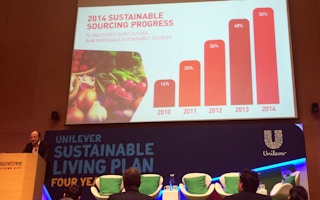It has been four years since consumer goods giant Unilever announced its ambitious ‘Sustainable Living Plan’ and the report card is out.
While it has done well on social indicators like improving community well-being and farmer livelihoods, its efforts to reduce environmental impact remains “a mixed picture, with a lot of work to be done”, said Peter ter Kulve, Unilever president of Southeast Asia and Australasia.
Speaking at a Unilever event on Thursday in Singapore’s Mapletree Business City, he shared that the company is “doing really well” on its plans to improve the social and economic welfare of the communities it operates in and serves.
On the environmental front, it has also made “good progress” on reducing its water and energy use, and ensuring that its factories send zero waste to landfills, but the company is finding it tough to reduce greenhouse gases, he said.
Unilever’s Sustainable Living Plan was first launched in 2010 and set out to improve the well-being of more than a billion people, halve the environmental impact of its product and enhance millions of livelihoods by 2020.
Since then, the company has managed to reach out to 397 million people with its initiatives related to personal and oral hygiene, and helped 800,000 smallholder farmers gain access to training and support that will significantly improve their livelihoods.
The company has also reduced waste associated with product disposal by 12 per cent and lowered the water impact of their products by two per cent.
But while Unilever’s carbon dioxide emissions from energy have dropped by almost 40 per cent since 2008, its greenhouse gas impact per consumer use has increased by about four per cent since 2010.
The company attributes this partly to their acquisition of American consumer products group Alberto Culver in 2010, which owns beauty brands such as St Ives, VO5, and Tresemme, among others.
When it comes to ensuring that the agricultural raw materials used by Unilever are sustainably sourced, it has managed to more than triple the share of products purchased from responsible suppliers from 14 per cent in 2010 to over 55 per cent in 2014.
This strengthens the resilience of Unilever’s supply chain while having a positive impact on its producers and the environment, said Unilever.
Unilever’s commitment to sustainable sourcing has included a target to buy 100 per cent of its palm oil from sustainable sources by 2015, and to ensure it is traceable back to its source by 2020.
The company’s palm oil is already fully sustainable, and it is on target to achieve the traceability goal by the 2020 deadline.
In addition to its own sustainability initiatives, a company with Unilever’s size and clout also has the potential to drive change at an industry-wide and even at the policy level, said ter Kulve.
For example, Unilever is one of the world’s largest consumers of palm oil, and by forcing its suppliers to adopt sustainable practices, the company had made a real difference to the palm oil industry, he added.
“We leverage our influence to make things happen,” ter Kulve explained, while stressing that working with suppliers, governments, and non-government organisation was essential to driving progress on its social and environmental performance.
External partners present at the discussion - attended by about 200 Unilever employees and corporate partners - agreed that Unilever had made notable progress on its sustainability goals, but also highlighted key areas where the company could do more.
Kavita Prakash-Mani, executive director of Grow Asia, a World Economic Forum initiative on sustainable agriculture, urged Unilever to pursue innovation in areas such as mobile phone payments in rural areas and new consumer products.
The company has so far also put more efforts into marketing some of its brands as having a greater environmental or social purpose, including soaps such as Dove and Lifebuoy and Ben & Jerry’s ice cream.
These brands have grown at twice the rate of the rest of the business, and spells the potential for other Unilever brands to be harnessed for good, said observers.
Nico Stouthart, managing partner of branding agency MBVermeer, said: “Where Unilever can start doing a better job, is finding this purpose for all your brands”.

















